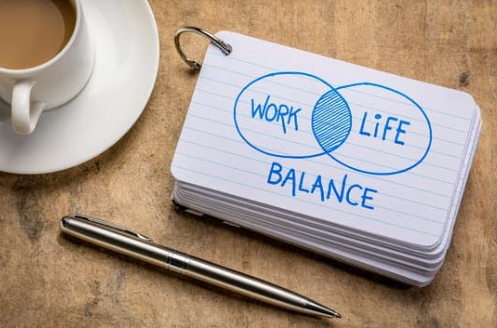Benefits of Having a Good Balance
Having a good work-life balance is essential for overall well-being and happiness. It involves effectively juggling between professional and personal responsibilities, Achieving this balance yields numerous benefits, positively impacting both physical and mental health.
Maintaining a healthy work-life balance leads to improved physical health. It allows individuals to prioritize their well-being by allocating sufficient time for exercise, proper nutrition, and adequate rest. Regular exercise helps in reducing the risk of chronic diseases, improving cardiovascular health, and maintaining a healthy weight. Additionally, getting enough rest and proper nutrition boosts the immune system, leading to better overall health.
Mental health also greatly benefits from a good work-life balance. Taking time for personal activities and hobbies provides an outlet for stress and promotes happiness. It helps in reducing feelings of burnout and anxiety, fostering a positive mindset. Furthermore, spending quality time with loved ones strengthens relationships, promoting a sense of belonging and emotional well-being.
Job satisfaction is closely linked to work-life balance. It enables individuals to have time for personal interests and activities outside of work, leading to increased job motivation and engagement. By experiencing a sense of fulfillment in various aspects of life, individuals are more likely to feel satisfied with their careers and perform better in their roles.
Reduced stress levels are another significant benefit of maintaining work-life balance. Chronic workplace stress has been linked to various health issues, such as high blood pressure and mental health problems. Having time to relax, unwind, and engage in personal activities helps individuals manage stress effectively, resulting in improved overall well-being.

Identifying Imbalance
Identifying a poor work-life balance is crucial in order to make positive changes and achieve a healthier and more fulfilling lifestyle. Here are some common signs that indicate a work-life imbalance:
1. Having an overly busy schedule: If you find yourself constantly overwhelmed by work responsibilities and unable to find time for personal activities or relaxation, it may be a sign of imbalance.
2. Neglecting personal relationships: When work consistently takes precedence over spending quality time with loved ones, it can lead to strained relationships and feelings of isolation.
3. Decreased productivity and job satisfaction: If you notice a decline in your productivity and lack of motivation at work, it may be a result of excessive work demands and neglecting personal interests.
4. Lack of self-care: Neglecting self-care activities, such as exercise, proper nutrition, and rest, indicates an imbalance between work and personal life.
5. Feeling guilty or anxious about taking time off: If the thought of taking vacation time or personal days makes you feel guilty or anxious, it suggests a higher priority given to work over personal well-being.
To identify work-life imbalance, it is important to honestly assess these indicators and evaluate the amount of time and energy dedicated to work versus personal life. Recognizing these signs is the first step in achieving a healthier work-life balance.
Tips and Tricks for Maintaining Balance
Maintaining a healthy work-life balance is crucial for our overall well-being. Here are five practical tips and tricks to help you achieve this balance:
1. Master time management: Efficiently allocate your time between work and personal activities. Prioritize tasks and set realistic deadlines to ensure you accomplish your work goals without sacrificing time for hobbies.
2. Prioritize and set personal goals: Identify your personal priorities and establish clear goals for both your professional and personal life. This will help you maintain focus and ensure that you are dedicating adequate time to all areas of your everyday life.
3. Develop healthy habits: Incorporate healthy habits into your daily routine. Regular exercise, proper nutrition, and sufficient rest are essential for maintaining physical and mental well-being, promoting productivity, and reducing stress levels. Make sure you set aside time for lunch breaks and mental checks to allow yourself to unwind during the day.
4. Learn to say no: It is important to establish boundaries and learn to decline additional work commitments when necessary. Saying no allows you to prioritize your own needs and prevent burnout.
5. Utilize a flexible work schedule: If possible, create a daily schedule with flexible hours to help create a balance between professional life and time with family. This can provide more control over your schedule and allow for better integration of work and personal life.
Maintaining a healthy work-life balance has numerous benefits. It leads to increased productivity, job satisfaction, and overall life satisfaction. It also enhances mental health, reduces stress levels, and strengthens personal relationships. By implementing these tips and tricks, you can create a harmonious and fulfilling life where work and personal time coexist in a healthy balance.
Maintaining a healthy work-life balance is essential for our overall well-being. It leads to numerous benefits, including improved physical and mental health, increased job satisfaction, and reduced stress levels.
If you are struggling to achieve a good work-life balance, there are a number of things you can do, such as mastering time management, prioritizing your personal goals, developing healthy habits, learning to say no, and utilizing a flexible work schedule.
At desk chair we understand that having a balanced workspace is important for maintaining a healthy work-life balance. That’s why we offer a perfect hybrid option that allows you to create your own flexible schedule each week. We create a community for everyone that helps your workspace feel a little more balanced.
Join our hard-working community today and get the benefits of having a balanced lifestyle. We can’t wait to meet you!